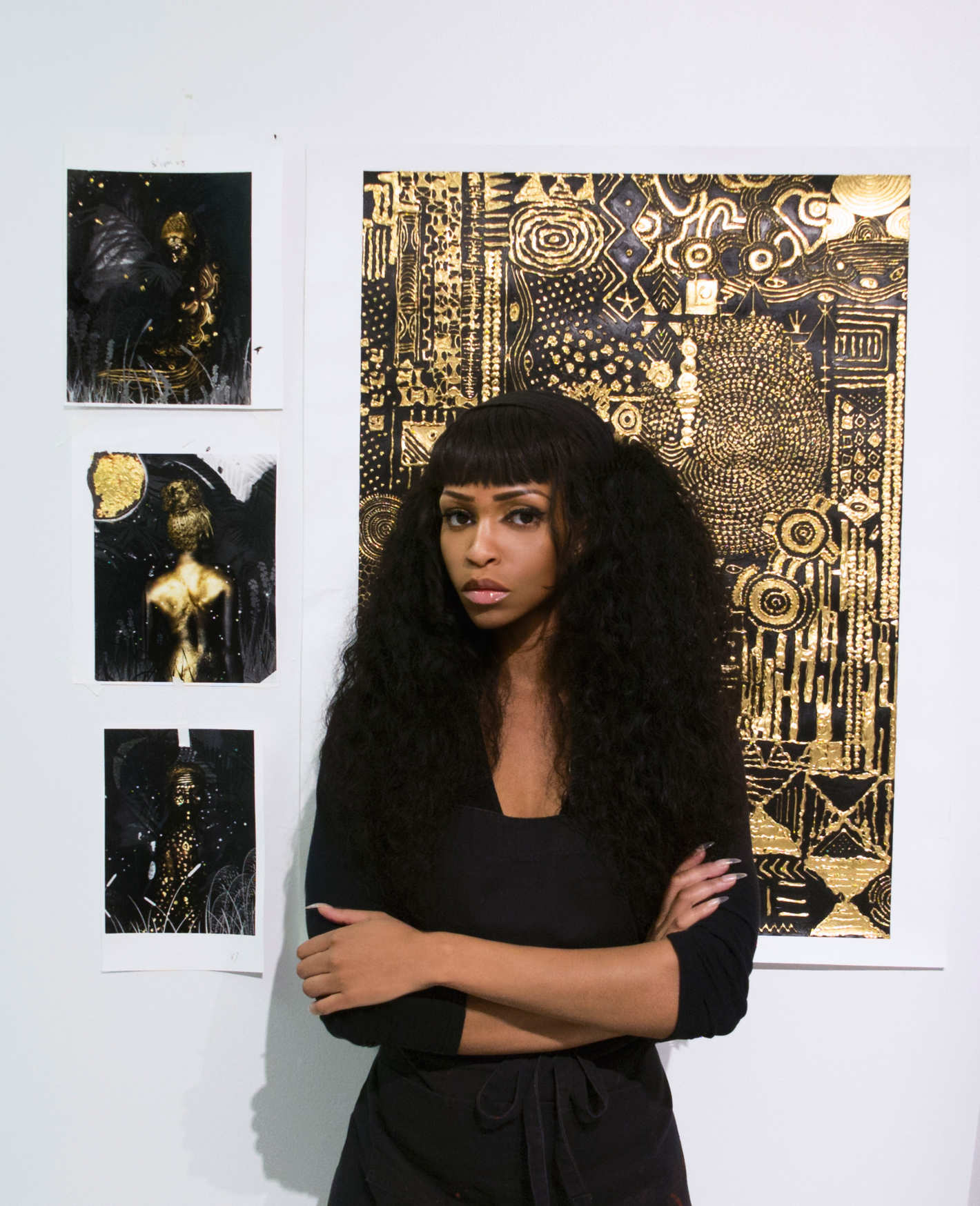
Mariane Ibrahim’s booth at the Armory Show would be a showstopper no matter what. An ebony latticework around its perimeter provides a dramatic frame for the richly gilded paintings of Lina Iris Viktor, the New York-based British-Liberian artist who recently made headlines when she sued rap superstars Kendrick Lamar and SZA for allegedly stealing her work in their new Black Panther music video, from the soundtrack of the first Marvel superhero film to feature a black lead.
At the fair, the Seattle-based dealer Ibrahim was weary of the controversy, in which Lamar’s team stands accused of lifting the video’s design aesthetic from Viktor’s “Constellations” series, the latest works of which are currently on view at the Armory. The film’s creators asked the artist twice for permission, Viktor maintains, which she declined to give. When the video for “All the Stars” was released, just ahead of the film, Viktor was shocked and offended to see how closely it resembled her work.
A screen grab from Kendrick Lamar’s “All the Stars” music video, from the Black Panther soundtrack compared to Lina Iris Viktor’s Constellation I. Courtesy of Universal Music Group; Mariane Ibrahim Gallery, Seattle.
“It is really unfortunate that this happened at a really crucial moment of preparation, totally interrupting the artist and me,” Ibrahim told artnet News. Their energies had been laser-focused on the Armory Show “until this happened,” she added.
Ibrahim said that the video “appropriated and misinterpreted” Viktor’s “highly feminized” work, which is based on ancient Egyptian and African symbolism. Each painting is molded in resin and then coated with 24 karat gold leaf and black paint. The gold refers to the “sacred notion of how ancient cultures used gold in ornaments,” the dealer explained, and is intended as a reaffirmation of the wealth and richness of African heritage. Each work is unique, and the process is time-consuming and laborious.
Lina Iris Viktor, Materia Prima II (2017–18). Courtesy of Mariane Ibrahim Gallery, Seattle.
At the fair, the artist chose to screen her works behind the lattice—inspired by the mashrabiya windows popular in Arabic architecture and the nets used by Liberian fisherman—so that “all my works are at once visible and not discoverable,” said Viktor in a statement. “For me, to discover means to unexpectedly find something, to take and claim ownership—it is reflective of the way the African continent has experienced conflicts and pillages of material and intellectual resources over centuries, and in many ways still does today. This break from convention is about creating a new space—it is about re-envisioning the curatorial/fair model from a non-Western viewpoint.”
Immediately inside the space, a new double-sided self-portrait—the artist is often her own model—presents a fierce agenda. Titled He Banished me from Heaven & believed he grabbed my grapes…. But he didn’t, the work was initially inspired by Donald Trump’s infamous hot-mic remarks about grabbing women by the genitals, which the artist felt “legitimized people to act in a despicable way,” according to Ibrahim. Then, after the Kendrick episode, Viktor altered the painting by adding gold grapes to the pubic area.
Lina Iris Viktor, He Banished me from Heaven & believed he grabbed my grapes…. But he didn’t. Courtesy of Mariane Ibrahim Gallery, Seattle.
Like the artist, Ibrahim remains furious about the unwelcome spotlight, because she wants the artist “to evolve organically,” she said. “The art market you can’t control, taste you can’t control, but when you can’t control your own artwork within your own studio then you know that something is broken.” She is closely working with the artist on her lawsuit, which she hopes will send a message not only that you can’t steal an artist’s work, even if it’s routine in music to sample: “We are not scared.”
Viktor, meanwhile, may happily be too busy to give her case much thought: She has an upcoming solo show at the New Orleans Museum of Art in October, timed to coincide with the city’s tricentennial, and is set to appear in Manifesta in Palermo come June.
3-D rendering of Lina Iris Viktor’s “The Black Arc” 2018 Armory Show presentation at Mariane Ibrahim Gallery. Courtesy of Mariane Ibrahim Gallery, Seattle.
At the Armory Show, Viktor’s work is priced from $24,000 to $55,000, with a striking nude self-portrait already sold for $35,000. Early interest in the other works was strong, as collectors—including Alan Faena, trying to remain incognito in a hood—streamed through the booth to acquaint themselves with the artist.
“I’m very proud to work with her,” said Ibrahim.